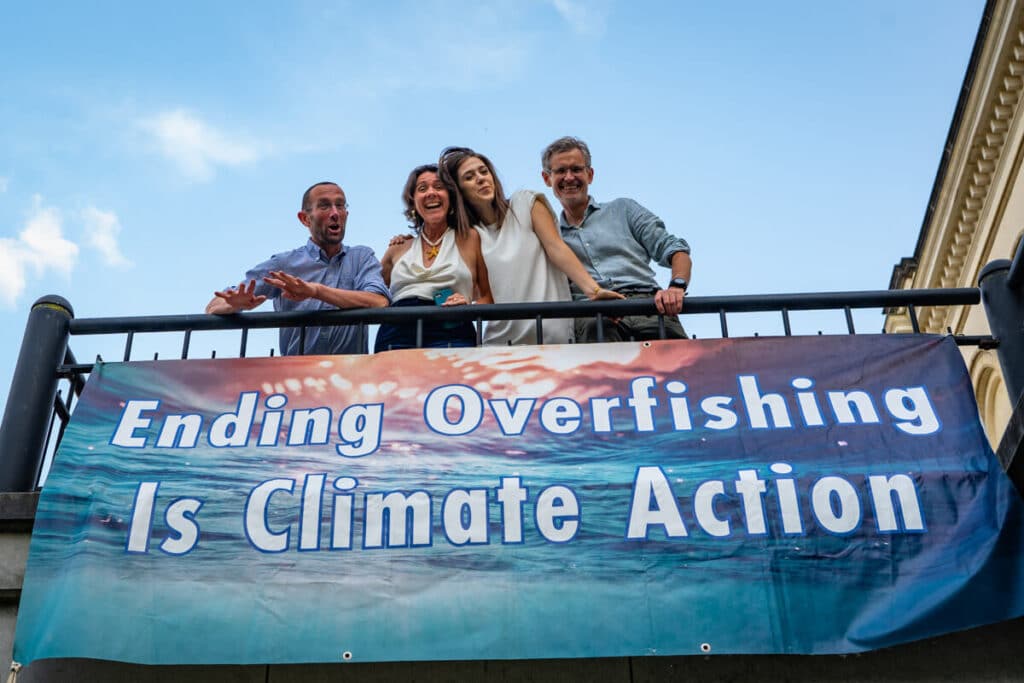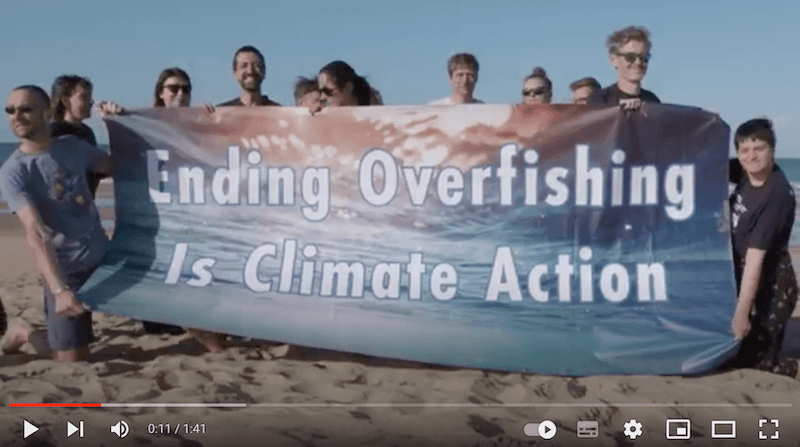
The Our Fish team in Brussels, 5 June 2023
This may come as a surprise – but it was always the plan.
Our Fish began in 2017 as a short term project to help end overfishing in the EU. We didn’t finish in 2020, as first planned – because by then we’d realised the critical importance of getting the climate and ecosystem impacts of fishing recognised, and there was still a lot of work to be done.
Now, by collaborating with scientists, NGOs, members of parliament, policymakers, fishers and artists, we’ve successfully changed the political agenda. It’s time to step back and allow other NGOs and campaign groups to carry the work forward.
Check out some of the highlights in this video:
-
-
-
- We’ve worked with scientists around the world to reframe fisheries management as carbon management and climate action. We’ve run briefings, workshops, seminars, open letters, science symposiums, webinars, ocean dives, events in the EU, at UN climate conferences (UNFCCC COPs), the UN Ocean Conference and in EU member states.
The International Council for the Exploration of the Sea has now established a workshop and group to investigate and calculate the impact of fishing on ocean carbon. The science on this will continue to progress and provide the data needed for the EU to make better fisheries management decisions for the sake of the climate.
. - We’ve shown that a just transition to low impact and low carbon fishing is possible. We worked with fishers, scientists and economists to show that the EU Common Fisheries Policy already has in place the necessary tools for incentivising a shift to low impact and climate wise fishing that is also beneficial for fishers and coastal communities. There is no longer any excuse for subsidies and quotas to benefit destructive fishing practices and the fossil fuel industry – these benefits should only go to responsible and sustainable fishers, and fuel a positive feedback loop of incentives for improving sustainable fisheries.
.
The European Commission has committed to developing a guide for the use of environmental, social and economic criteria when allocating fishing quota to incentivise the transition to low impact low-carbon fishing. The European Commission and Council are also negotiating the elimination of fossil fuel tax subsidies, which should be concluded by mid-2024.
. - Tens of thousands of people, artists and allies have taken action to show EU fisheries and environment ministers that there is strong public support for ending overfishing. Together we’ve signed petitions, emailed MEPS, sent postcards, projected messages on EU buildings, made a public mural in Lithuania, sent our very own superheroes – the ‘Ocean Avengers’ – to Brussels and much more!
.
In the recent Marine Action Plan package, the EU Commission committed to mapping blue carbon and the impact of fishing on the seabed, as well as phasing out destructive bottom trawling – there is still a way to go, but EU decision makers have heard us.
- We’ve worked with scientists around the world to reframe fisheries management as carbon management and climate action. We’ve run briefings, workshops, seminars, open letters, science symposiums, webinars, ocean dives, events in the EU, at UN climate conferences (UNFCCC COPs), the UN Ocean Conference and in EU member states.
-
Thank you to all of you that have taken action to address overfishing in the EU and helped change the outlook for fish, the ocean and the climate!Throughout the campaign, we’ve worked closely with allies across the NGO world. As Our Fish steps back, they will be continuing work to protect the biodiversity of the ocean and ensure that the fish in our ocean can continue to play their essential role in combating climate change, so do get in touch with them to continue following this effort.
Seas At Risk, EU
Oceana, EU
ClientEarth, EU
Deutsche Umwelthilfe, Germany
BirdWatch, Ireland
Sciaena, Portugal
BLOOM, France
Ecologistas en Acción, Spain
WWF, Poland
Bye for now!
The Our Fish Team
-

